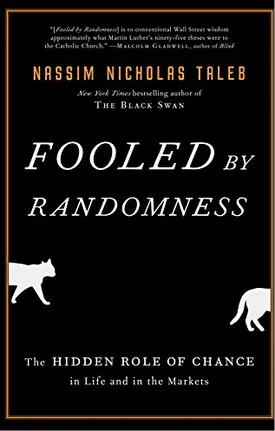Fooled by Randomness: The Hidden Role of Chance in Life and in the Markets by Nassim Taleb
The book Fooled by Randomness by Nassim Taleb dives into the role of chance and how it affects people’s lives and their investment decisions. Based on his own personal experiences in the financial markets, Taleb explains how the world of finance and investment has been greatly influenced by luck. This book examines how chance plays a larger role in life than many people realize, and it encourages readers to analyze the data they are presented with much more closely, before coming to any conclusions.
Taleb introduces the concept of “fooled by randomness” — or FBN — in this book as a term to describe how people are regularly swayed by short-term successes and ephemeral trends and lead to foolish decisions. The author examines the role of luck and how it affects our decision-making process. FBN occurs when people observe events and make conclusions they believe to be accurate, despite lacking the necessary data or factual background to be able to make an informed choice.
The book goes on to explore the roles of probabilities and fate in life, and how these can often lead to results that appear to be amazing coincidences. Taleb explains how people often think of certain events as assumptions of universal laws, when in reality, they were just the result of chance. The author also explains the concept of “Blackswan” events — rare but high-impact events — and how they can often be wrongly interpreted. He uses this to illustrate how this phenomenon occurs in the financial markets, in which participants make decisions based on their own perception of a situation, which may be flawed.
Taleb also explicates the way in which our brains have difficulty recognizing randomness, due to the way our brains are hardwired to recognize patterns that do not exist. He shows how our evolutionary development has made us vulnerable to believing in links in events that are not actually linked and how this lack of objectivity leads to faulty decision-making.
The author also examines the concept of “survivorship bias” which is when people focus on those who have “survived” an event or have succeeded in an endeavor and ignore or discredit those who have not. This usually occurs in the stock market, where people tend to look at the success stories and forget about those who have failed. Taleb also touches upon the concept of “the bear” and “the bull”, which are metaphors for different economic conditions in the stock market.
Taleb also shows how the idea of luck being a “skill without a teacher” can be both liberating and devastating. He demonstrates how a small edge or edge-like chance can be extremely valuable if leveraged correctly, due to the relative absence of competition and the lack of “teachers” that can show the way. However, he also cautions readers against putting too much stock in chance because it is not a long-term strategy and can lead to calamitous mistakes.
The book is an interesting read that looks at the role of chance and luck, as well as the concept of “fooled by randomness,” in life and investments. Taleb’s analysis of our innate tendency to oversimplify and downplay the role of chance provides a much-needed insight and perspective into the markets. The book encourages readers to think before they believe, and to be more critical and objective in the face of uncertainty.

